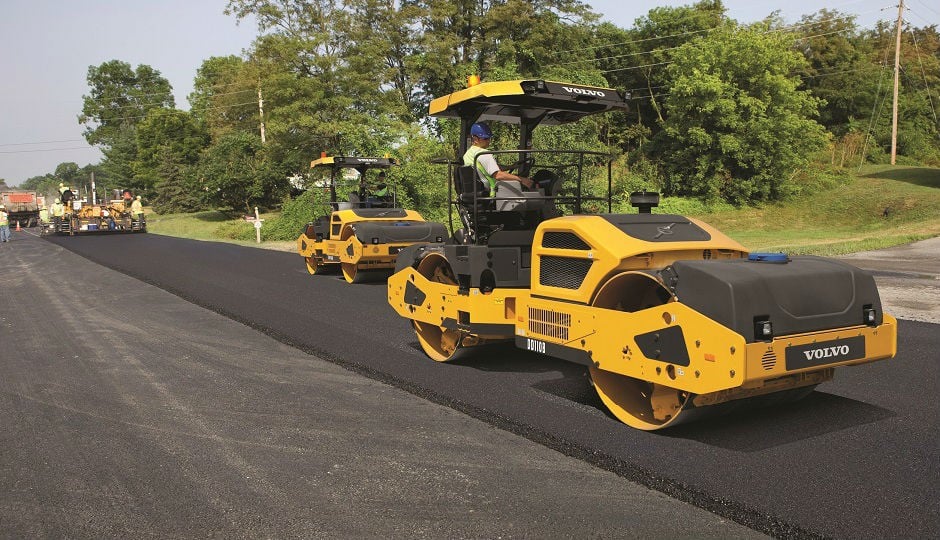Physical Address
304 North Cardinal St.
Dorchester Center, MA 02124
Physical Address
304 North Cardinal St.
Dorchester Center, MA 02124

Quality paving relies on far more than simply laying asphalt across a surface. It requires accuracy, attention to detail, and the right equipment to achieve a smooth, durable, long-lasting result. At the center of this process stands one essential machine, the Volvo DD128C asphalt compactor. This strong piece of machinery is essential for making sure freshly poured asphalt adheres correctly, resists premature wear, and keeps its smooth finish over time. Understanding why asphalt compactors are so important reveals how precision is the true foundation of effective road construction.
Compaction is essential because it reduces the air voids within asphalt, ensuring the mixture bonds tightly and consistently. Without adequate compaction, pavement becomes vulnerable to moisture infiltration, cracking, and rutting. These problems eventually lead to costly repairs and unsafe driving conditions. Asphalt compactors provide uniform pressure across the surface, pressing the layers together to create a structure that can support heavy loads and withstand long-term use. The more precisely this compaction is performed, the better the overall pavement quality will be.
Depending on the paving job, several types of asphalt compactors are made to offer different advantages. Smooth drum rollers are ideal for finishing surfaces because they provide even, consistent pressure across a wide area. Pneumatic-tired rollers apply varying pressure through rubber tires, which helps achieve deeper compaction and enhances the pavement’s density. Vibratory rollers use high-frequency vibrations to compact thick layers efficiently and are especially useful for large-scale roadwork. Each type brings unique strengths to the process, but all share the common goal of creating a tightly bound and durable pavement structure.
Precision in compaction is not simply about applying force. It requires controlling speed, vibration settings, temperature, and the number of passes over the asphalt. If asphalt cools too quickly, proper compaction becomes difficult, and the surface can weaken. At the same time, too much pressure or the wrong vibration frequency can cause structural damage within the mixture. An experienced operator uses the compactor with strategic accuracy, ensuring each section receives optimal treatment. This precision directly impacts the strength, smoothness, and long-term performance of the pavement.
Durability is one of the primary reasons asphalt compactors matter in quality paving. Properly compacted asphalt resists water penetration, which is a leading cause of pavement deterioration. When water enters cracks or gaps in the mixture, it can erode the layers beneath the surface. Over time, this leads to potholes, uneven surfaces, and dangerous driving conditions. A strong, compacted surface prevents these issues, keeping roads safer and reducing repair expenses. This is why contractors emphasize compaction during every stage of the paving process.
Asphalt compactors do more than create strong pavement. They also help improve efficiency on construction sites. Modern compactors often come with advanced technology, such as sensors and automated controls, that guide operators to achieve accurate compaction with fewer passes. This reduces project timelines and labor costs while improving consistency across the site. By maximizing the efficiency of the compaction process, paving teams can complete projects more quickly without sacrificing quality.
Even with advanced equipment, the skill of the operator remains essential. Precision compaction requires understanding the behavior of asphalt, adjusting machine settings, and ensuring that every section is compacted at the right temperature. Well-trained operators can identify issues during the compaction process and take corrective action immediately. This human element is a major factor in the success of any paving project, proving that great equipment performs best when paired with expertise.
Asphalt compactors are truly at the heart of quality paving. They ensure strength, durability, and a smooth surface by eliminating air voids, increasing density, and bonding the layers effectively. The precision with which compaction is carried out determines how long the pavement will last and how well it will perform under daily traffic demands. From preventing early deterioration to improving project efficiency, asphalt compactors bring unmatched value to modern road construction. Their role in creating strong, reliable, and long-lasting pavement highlights the power of precision in every successful paving project.